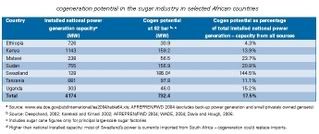UNEP launches 70MW of bioenergy and small hydro projects in East African agricultural industries: poverty alleviation, rural development
 The United Nations Environment Programme (UNEP) has launched two new renewable energy initiatives in the eastern and southern African agricultural sector aimed at strengthening access to energy in rural areas, greening power generation and alleviating poverty. The tea and sugar industries, which employ millions of farmers in the region, will become recipients of small hydropower and bioenergy projects, resulting in more than 70MW of decentralized sustainable energy. The UNEP recently published its new state of the world environment report - the Global Environment Outlook-4 - in which it stresses the urgent need to take sustainable development seriously and why clean energy lies at its core.
The United Nations Environment Programme (UNEP) has launched two new renewable energy initiatives in the eastern and southern African agricultural sector aimed at strengthening access to energy in rural areas, greening power generation and alleviating poverty. The tea and sugar industries, which employ millions of farmers in the region, will become recipients of small hydropower and bioenergy projects, resulting in more than 70MW of decentralized sustainable energy. The UNEP recently published its new state of the world environment report - the Global Environment Outlook-4 - in which it stresses the urgent need to take sustainable development seriously and why clean energy lies at its core.The two pioneering initiatives - Cogeneration for Africa and Small Hydro for Greening the Tea Industry - are being spearheaded by UNEP with the African Development Bank (ADB) as co-implementer and supported by the Global Environment Facility (GEF). Co-financiers are the Renewable Energy and Energy Efficiency Partnership (REEEP) and the EU's ProInvest. The projects, worth around $100 million in total, are being co-executed by the East African Tea Trade Association (EATTA) and the Energy, Environment and Development Network for Africa (AFREPREN/FWD).
These two new UNEP-led projects showcase the multiple benefits sustainable development can have for rural areas, offering social, economic and environmental benefits that help locally and globally. - Monique Barbut, CEO and Chairperson of the Global Environment FacilityThe East African Tea Trade Association will begin its four year initiative to establish six small hydropower demonstration projects in at least four EATTA member countries generating a total of 10MW. The industry will use resources available at tea plantations to power the industry, rather than utilize expensive electrical resources. The demonstration is expected to stimulate 82MW of small hydro capacity in the region over the coming years. The project has been endorsed by eight countries in the region, namely: Kenya, Uganda, Malawi, Zambia, Burundi, Mozambique, Rwanda and Tanzania.
Meanwhile the sugar industry is preparing to produce its own electricity and heat in a series of cogeneration projects modeled on the success of biomass cogeneration in Mauritius, where up to 40 per cent of the country's electricity needs are met by waste by-products from the sugar industry. The sugar industry’s initiative will last six years and is expected to result in the development of 60MW of biomass cogeneration projects in its initial pilot phase, and eventually set the stage for the installation of over 200MW of cogeneration capacity across the region, out of a total current potential of 730MW (table, click to enlarge). The project thus seeks to significantly scale up the use of biofuels in efficient cogeneration systems in seven Eastern and Southern African countries, namely: Kenya, Ethiopia, Malawi, Sudan, Uganda, Tanzania and Swaziland.
 UNEP and GEF say that the two new projects offer the chance to develop new forms of indigenous energy generation that will assist with development in rural areas and help overcome poverty; reduce dependency on often imported and expensive fossil fuels while having the spin off benefit of contributing to the reduction of greenhouse gases. Finally, the initiatives will greatly improve access to electricity on the continent where more than half a billion people go without this most basic of services (map, click to enlarge):
UNEP and GEF say that the two new projects offer the chance to develop new forms of indigenous energy generation that will assist with development in rural areas and help overcome poverty; reduce dependency on often imported and expensive fossil fuels while having the spin off benefit of contributing to the reduction of greenhouse gases. Finally, the initiatives will greatly improve access to electricity on the continent where more than half a billion people go without this most basic of services (map, click to enlarge): energy :: biomass :: bioenergy :: hydropower :: renewables :: sugarcane :: tea :: poverty alleviation :: rural electrification :: sustainability :: UNEP :: East Africa ::
energy :: biomass :: bioenergy :: hydropower :: renewables :: sugarcane :: tea :: poverty alleviation :: rural electrification :: sustainability :: UNEP :: East Africa :: The decision by some countries in East Africa to establish Power Purchase Agreements - contracts that allow unconventional generators of electricity to sell surplus power back to the Grid - has opened up a raft of new opportunities for cleaner and renewable energy generation. - Achim Steiner, UN Under-Secretary General and UNEP Executive DirectorMonique Barbut, CEO and Chairperson of the Global Environment Facility added that this latest partnership between GEF and UNEP is a concrete example of how under the right government policy framework, sustainable development can work, and does work.
Both regional initiatives were formally presented by Kenyan President, H.E. Mwai Kibaki, who stressed the need for rural electrification and alternatives to costly fossil fuels.
With the rising cost of oil in the world market, there is need to develop alternative sources of energy. In Africa, the status of rural electrification remains under 10 %. The small hydropower and cogeneration facilities, when installed, fit perfectly and would contribute to the rural electrification requirements of our region. - Kenya's President Mwai KibakiThe importance of harnessing alternative forms of energy generation is highlighted in the latest assessments of the Intergovernmental Panel on Climate Change (IPCC) and UNEP's new state of the world environment report - the recently launched Global Environment Outlook-4.
In December, in Bali, governments will meet to define the ground rules for a new international emissions reductions regime to kick in post 2012. UNEP's slogan is 'Transition to a Low Carbon Society'-this is a transition that is just as important for developing and for developed countries. There is no reason why nations of the South must or should follow the dirty development paths of the past. - Achim Steiner, UNEP Executive DirectorThe initiatives are co-financed by the Renewable Energy and Energy Efficiency Partnership (REEEP) and ProInvest. REEEP funding for the project was provided by the Government of Ireland which targets sustainable energy projects in Sub-Saharan Africa.
Energy lies at the core of the sustainable development challenge. Energy is essential for development and economic growth, yet our conventional energy systems are having a serious negative impact on our environment, as emphasized by the IPCC recently, and our environment’s potential to sustain that development and growth. Ireland is proud to support REEEP’s initiatives in Africa, which will ensure that social and economic development is consistent with minimizing climate change. - John Gormley, Irish Minister for the Environment, Heritage and Local GovernmentThe contributions from the Irish Government enable REEEP to support projects in eastern and southern Africa, including Ethiopia, Lesotho, Mozambique, Tanzania, Uganda and Zambia.
The launch of the projects was followed by a two-day REEEP sponsored training workshop on “Financing Cogeneration and Small-Hydro Projects in the Sugar and Tea Industry in East and Southern Africa”. The workshop provided industry representatives with a clear understanding of the barriers to financing renewable energy and energy efficiency in the tea and sugar industries; provided a comprehensive grasp of the risks associated with lending to sugar and tea industries for energy projects and how to mitigate these risks; and increased awareness among financial institutions and investors of the opportunities for financing REEEP in agro-industries and options for managing risks.
The Global Environment Facility is an international financial mechanism with 178 member countries that addresses global environmental issues while supporting national sustainable development initiatives. GEF grants support projects in developing countries related to biodiversity, climate change, international waters, land degradation, the ozone layer and persistent organic pollutants. Since its inception in 1991, GEF has achieved a strong track record of support to developing countries and countries with economies in transition, providing $6.2 billion in grants and leveraging $20 billion in co-financing for over 1,800 projects in over 150 countries. Through its Small Grants Programme (SGP), GEF has also made more than 7,000 small grants, up to $50,000 each, directly to nongovernmental organizations and community organizations.
The United Nations Environment Program is involved in a series of projects to address environmental consequences of energy production and use, and assists decision-makers in governments and the private sector to make better, more informed energy choices which fully integrate environmental and social costs. GEO-4, which was released on 25 October, is the latest in a series of flagship UNEP reports assessing the current state of the global atmosphere, land, water and biodiversity. It is the most comprehensive UN report on the environment, prepared by about 390 experts and reviewed by more than 1,000 others across the world over a five-year period.
The Renewable Energy and Energy Efficiency Partnership (REEEP) is an active, global public-private partnership that structures policy and regulatory initiatives for clean energy, and facilitates financing for energy projects. Backed by more than 200 national governments, businesses, development banks and NGOs, REEEP is uniquely placed to contribute to international, national and regional policy dialogues. Our aim is to accelerate the integration of renewables into the energy mix and to advocate energy efficiency as a path to improved energy security and reduced carbon emissions, ensuring socio-economic benefits.
Picture: Sugar cane in Kenya being transported to a factory. ‘Cogen for Africa’ aims to get biomass-based CHP on the road for east and southern Africa. Credit: UNEP/Cogen for Africa.
References:
UNEP: COGEN for Africa - project overview, with a wealth of information on bioenergy and rural development.
UNEP: Greening the Tea Industry in East Africa - project overview.
UNEP: Global Environment Outlook: environment for development (GEO-4) - October 2007.
UNEP-GEF, AfDB, REEEP, EATTA and AFREPREN/FWD: Joint Small Hydro and Cogeneration Projects Launch and Capacity Building Workshop - November 8, 2007.
 --------------
--------------
 South Korea plans to invest 20 billion won (€14.8/$21.8 million) by 2010 on securing technologies to develop synthetic fuels from biomass, coal and natural gas, as well as biobutanol. 29 private companies, research institutes and universities will join this first stage of the "next-generation clean energy development project" led by South Korea's Ministry of Commerce, Industry and Energy.
South Korea plans to invest 20 billion won (€14.8/$21.8 million) by 2010 on securing technologies to develop synthetic fuels from biomass, coal and natural gas, as well as biobutanol. 29 private companies, research institutes and universities will join this first stage of the "next-generation clean energy development project" led by South Korea's Ministry of Commerce, Industry and Energy.









0 Comments:
Post a Comment
Links to this post:
Create a Link
<< Home